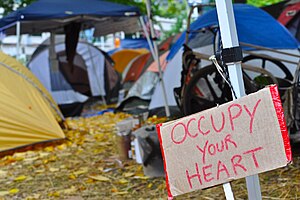| Image via Wikipedia |
What people believe (faith-religion) is political because it influences their actions and because it is the vehicle by which a religion perpetuates a social system. Politics and religion are interdependent. Every new social structure strives to come up with some kind of mythology of divine origin for its values and aims. The mythology is passed on for generations, and often its validity goes unquestioned for centuries... Who absorbs whose culture is a crucial issue on the cultural battlefield. Those who refused to accept this accommodation and continued to practice te ancient art were persecuted... Today, given the patriarchal society within which we live... a feminist politic... says clearly that the real enemy is the internalized and externalized policing tool that keeps us in fear and psychic clutter.
-- Z. Budapest, "Women's religion, as in heaven, so on earth." in The Holy Book of Women's Mysteries.
Some time ago, I wrote a paper (which requires an extensive re-working) in criticism of what I perceived as a lack of interest in social justice actions among Neo-Pagan and Wiccan Goddess-devotees. Yesterday, I was conversing with someone and shared some continuing frustrations over the lack of visible and vocal participations by the Pagans, New Agers, Burners, and other "spiritual" people in the Occupy movement and other ongoing social actions. I noted that, as much as we the "progressives" and "revolutionaries" and "radicals" tend to demonize Christians for almost all the evils perpetuated by the One Percent and their political machinery, it is almost exclusively a Christian phenomenon to be vocally, visibly and actively engaged in social justice and anti-oppression work from a religious and spiritual context.
It has been Christian communities such as Metanoia United Methodist Church, St. David of Wales Episcopal Church, and St. Francis of Assisi Catholic Parish, that have offered significant, tangible aids to the Occupy Portland and stood in solidarity. (And First Unitarian Church and P'nai Or, of course, who also deserve a mention here.) On the other hand, I have not personally seen or met any Buddhist organization (in October I had contacted a few of them in town, no response, except from the Soka Gakkai International USA of Oregon, which ultimately did not do anything), or Pagan community (granted, there are many individuals actively engaged, but not a public statement from any established Pagan organization).
I thought of this phenomenon lately. Many people in the Western culture who chose Eastern religions or Neo-Paganism often did so in reaction to their Christian upbringings and the perception that Christianity became a tool for hate and greed. Many such people believe in separation of church and state, and do not feel that spirituality has to be in the public sphere. They may also say, "morality cannot be legislated," in reaction to the Religious Right's long-standing tendency to legislate against abortion and homosexuality.
Yet, much of what the Occupiers occupy against is a moral issue. It is a moral issue to denounce the One Percent who receive tax-funded bailouts after bailouts, while the government is forced to cut basic social services and education. It is a moral issue when the banks are making record profits while more houses are foreclosed and homelessness is on the rise. It is a moral issue when the militarized police across America are waging violent, indiscriminate wars on non-violent Occupiers and both federal and state legislators are preparing to pass more laws to strengthen the fascist police state, enrich privatized prison operators, and abridge fundamental human rights.
People who call themselves "progressive" and "radical" who are of any faith must take a stand, speak up, and occupy a moral high ground, in this society in which politicians and bureaucrats have long abandoned even a semblance of moral decency.
One of the phenomena that I have been noticing is the alarmist, fear-mongering and even paranoid rhetoric among some of the Occupiers. Granted, we cannot be naive; the militarized police and government intelligence apparatus view the Occupy or any mass movement as a form of civil unrest and therefore consider a threat to national security. It is also true that both Democrats and Republicans alike are agitating to prevent a kind of Arab Spring-style revolution from happening in the United States.
However, people of spiritual faith understand that there is a power in creative imagination and power of manifestation. If we only visualize and imagine a possible scenario of a future totalitarian military regime, then that is all what we will get in the future. Ironically, in so doing, we give the state a sense of legitimacy and power over us. As long as we believe in this doomsday scenario, we will not think of anything else.
As a person of faith, we have a powerful weapon, and that is the moral high ground. We ought to build what the first century Christians (counter-cultural radicals of that time!) called "The Kingdom of Heaven" -- a new system within the shell of the old, in which people can become good and goodness is encouraged and rewarded. This is not "theocracy" (which is nothing more than a perversion of fascism packaged in religious trappings) but is a collective mindful choice to live out our faith and morality, not in order to dominate others, but in order for us to live our best moral choices.
Therefore it is time to occupy a moral high ground.
This is not an official statement of the Interfaith Guild of Chaplains.


No comments:
Post a Comment